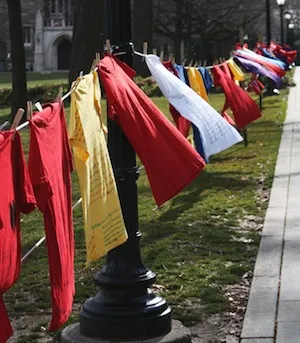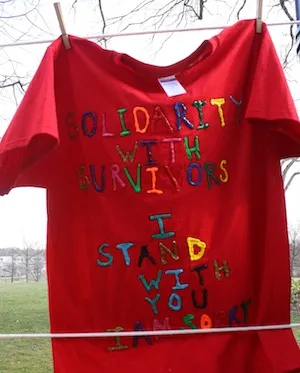Watch: Clothesline Project Expands and Educates
Instead of making the mad dash to class, last week many students stopped to read the row of colorful T-shirts hanging in front of Parrish Hall. The shirts - some ripped, some written on, and many covered in decorations - hung in the center of Swarthmore's campus and served as a reminder of the violence that can affect students' lives.
Students, faculty, and staff were invited to design T-shirts by organizers of the Swarthmore Clothesline Project, a yearly event that seeks to raise awareness about assault, rape, domestic abuse, and other forms of gender-based violence.
The Clothesline Project is part of a national organization that encourages survivors of sexual assault and their allies to design T-shirts that are anonymously displayed on a clothesline. Created by a group of women from Cape Cod, Mass. in 1990, it has now grown to over 500 projects nationally and internationally, with events everywhere from Tanzania to numerous college campuses across the country. At Swarthmore, the first Clothesline Project was organized by students and Assistant Dean Karen Henry '87 in 2006. Now the Sexual Misconduct and Resources Team (SMART) organizes the event, hosting T-shirt decorating sessions and planning events that raise awareness about gender-based violence and sexual assault.

"The Clothesline Project is very visual," explains Lisa Sendrow '13. "Although we talk about statistics all the time, this event shows that [survivors are] more than just numbers, we're also people." (photo by Allison Ranshous '13)
The colorful shirts correspond with a category of sexual violence: yellow shirts for domestic violence, red shirts for rape or sexual assault, blue shirts for incest and sexual abuse, purple shirts for violence because of perceived queer or trans identity, black shirts for politically motivated attacks, and white shirts for death that occurred as a result of sexual violence.
The Clothesline Project, facilitated by SMART member Lisa Sendrow '13, was also supported by numerous groups on campus, including the Delta Upsilon and Phi Psi fraternities, as well as Swarthmore's new sorority, Kappa Alpha Theta. Other organizations including the Queer Trans Conference, the Swarthmore Asian Organization, and OASIS, Swarthmore's poetry word collective, also served roles in supporting SMART in their efforts to create a week of awareness about rape and sexual assault.
"We're all coming together and supporting each other," says Sendrow, a sociology & anthropology and history major from Princeton, N.J. " [The Project] is a way for survivors to come out more and seek help and open themselves up to support systems on campus."
Also instrumental in the Clothesline Project's organization are Beth Kotarski, director of Worth Health Center, Student Wellness Coordinator Satya Nelms, and CAPS counselor Patricia Fichette.
"SMART is doing a wonderful job to convey that everything we all do contributes to a community where sexual violence is not tolerated," Nelms says. "The larger community can still be a part of the movement towards a less sexually violent atmosphere."
"Sexual assault affects everyone," adds Fichette. "More voices [participating] in dialogue allows for dialogue to be consistent and a success."
The visibility of the Clothesline Project was a matter of great importance for SMART in their organization of the event. Sendrow explains that "the Clothesline Project is very visual. Although we talk about statistics all the time, this event shows that [survivors are] more than just numbers, we're also people."
Once a smaller event held in the fall semester, this year's Clothesline Project organizers sought to increase the project's visibility by moving it to the spring and hosting other events on the topic of sexual assault, including a film screening of NO! The Rape Documentary, a spoken word performance, and other gatherings for students to process their experiences and connect with the community of survivors and allies on campus.
Most notably, students packed into LPAC Cinema to hear poet and spoken word artist Staceyann Chin speak about her experiences with sexual assault and her journey toward growth and healing. Chin, a queer Jamaican-born, half-Chinese resident of Brooklyn, deftly mixed humor, tragedy, and exuberant inner strength before a rapt audience in a performance of several excerpts of her memoir, The Other Side of Paradise.

"SMART is doing a wonderful job to convey that everything we all do contributes to a community where sexual violence is not tolerated," says Student Wellness Coordinator Satya Nelms. (photo by Allison Ranshous '13)
If Chin's serious and personal material seemed at first depressing, her ease and openness about her sexual exploits had the audience laughing rather than crying throughout the night. While her powerful performance challenged the audience to understand her experiences of prejudice and rape, she encouraged her listeners to "take a chance and leap with the evening... and lean into the experience."
Chin capped her performance with a reading of several poems, during which she ran up and down the aisles, throwing off her sweater and gesturing frantically as she guided the audience on a self-described "roller coaster" of emotions. "Regardless of what happened, we're on the other side of it," she says. "Regardless of what happened, I survived it."
After the performance, a long line of students waited to speak to Chin and receive a signed copy of her memoir, including Victoria Stitt '16. "I think it's fitting that she came during this week," she says. "I think she balanced the seriousness of assault and rape with a love of life and strength."
The Clothesline Project culminated in a collection held in the Friends Meetinghouse on Swarthmore's campus where SMART members, faculty, and students gathered to share their thoughts, poems, and support for a community on a journey of growth and healing. An estimated one in five women on college campuses has endured sexual assault, and the Swarthmore community is committed to improving the safety of students and increasing the available support systems on campus for survivors of sexual violence.
"I think it's amazing that the community has been open to learning and understanding about things that people don't always want to know about or talk about," says Osazenoriuwa Ebose '15. "There's a lot of learning surrounding sexual violence and assault. It's growth that should happen."



